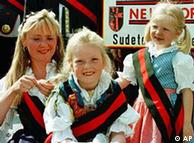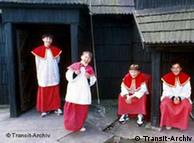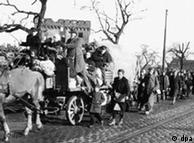|
|
|
|
#1 |
|
Senior Member
Join Date: Dec 2005
Posts: 2,499
|
Eastern Europe | 17.08.2007
Many Descendents of Expellees Reject Traditional Point of View  Many young people see things differently Many young people see things differently A generation gap exists between Germans expelled from Eastern Europe after World War II and their grandchildren. Many of the younger generation reject their elders' reactionary rhetoric but embrace their cultural roots. On Saturday, Germans expellees will commemorate Tag der Heimat or Day of the Homeland. Expellees will reflect on the injustices that occurred as the Third Reich crumbled, when millions of ethnic Germans were expelled from their homelands in Eastern Europe from 1944 onwards. The League of German Expellees (BdV), a politically powerful group which represents the ethnic Germans and their descendants, has celebrated Home Day since 1950. The league's critics accuse it of devoting undue attention to the suffering of German expellees whose fates, they say, were the direct consequence of the atrocities committed by the Nazis. It is also accused of antagonizing Germany's neighbors with demands for compensation and perennial plans to open a museum in Berlin. Leaving controversy behind  Can expellee groups keep young people interested? Can expellee groups keep young people interested?But experts say the descendants of expellees are uninterested in the controversial politics of their grandparents. For 17-year-old Veronika Moll, the remembrance day is not about politics but about dancing. Moll, a high school student in Munich, is part of a Silesian folk dancing group that performs at events like Tag der Heimat as well as at her hometown's famous Oktoberfest. She also takes part in conferences about expellee issues and other cultural activities. Both of Moll's grandmothers were expelled from Silesia, in southwestern Poland, at the end of World War II. While some people of the older generation feel Silesia belongs to them, Moll said she doesn't feel that way at all. Although she still feels special ties to Silesia, Munich is home. "It's simply not the situation that you can go back to Silesia. It's not practical. It's too long ago," Moll said. "It's important to not forget the history and to make sure that everyone knows what happened and that an injustice occurred. But you can't displace all of the Polish or other people who have lived in these houses or on this land for 60 years." Youth groups focus on future  The average age for many groups is getting older The average age for many groups is getting olderThis type of attitude is typical among the descendants of expellees, said Thomas Hoffmann, who heads the organization German Youth in Europe (djo-Deutsche Jugend in Europa.) While the first generation of expellees dreamed of returning home, their grandchildren are uninterested in going back, Hoffmann said. The first part of German Youth in Europe's name--djo--harkens back to its foundation in 1951 as a group to fight for the rights of German expellee youths. Over the years it has evolved into a more progressive organization which promotes reconciliation and integration. The group has approximately 90,000 members. "We are the bridge from the past to the future," Hoffmann said. Janna Keberlein, a 28-year-old student at the University of Düsseldorf, went this summer to Odessa on a djo-sponsored musical exchange. It was an amazing experience, Keberlein said. Keberlein's paternal grandparents were ethnic Germans deported from the Volga area to Kazakhstan during the war. Keberlein immigrated to Germany in 1996. Her grandparents get angry when they talk about how they were treated by the Russians, as do many in the older generation. Keberlein said she agrees that they were treated badly, but she believes that her future is in Germany. "There really is a generational difference," Keberlein said. "Young people don't have to be drawn into this history of suffering." She has absolutely no interest in being involved in the League of German Expellees, at least not with its current political outlook. A taboo subject  The Silesian traditions remain important to some youth The Silesian traditions remain important to some youthFor many young people, the BdV focus too much on the past. The group is aging fast, said Alfred de Zayas, a leading scholar on Germen expellees. When he gives talks to expellee groups, the average age is usually 60, he said. De Zayas served for years as a lawyer for the United Nations High Commissioner for Human Rights. He is currently a professor of international law at the Geneva School of Diplomacy. He wrote the first scholarly work on German expellees to appear in English, breaking what had long been a taboo topic. His books have been controversial in Germany. The post-war expulsions was the largest forced movement of Europeans in the 20th century. Historians estimate that between 12 and 15 million people were expelled during the forced migrations. Many expellees did not talk to their children or grandchildren about their traumatic experiences, said de Zayas. "If you see your parents or grandparents as perpetrators of grave war crimes you don't easily see them also as victims," he said. Finding an interest in cultural heritage  Expellees on the road to Germany Expellees on the road to GermanyYoung people from expellee backgrounds are only just now becoming interested in their cultural heritage, de Zayas said. He expects it will greatly increase in the future, much as black Americans began to become interested in their African roots in the 1980s. "It's important for your identity that you know where you come from," de Zayas said. "It's a peaceful activity. That's a good thing and I'm persuaded that will happen." While de Zayas feels expellees have legal rights to reclaim lost property, he doubts the younger generation will pursue the issue. Most are simply not interested. Trinity Hartman http://www.dw-world.de/dw/article/0,...741634,00.html |
|
|
#2 |
|
Banned
Join Date: Jul 2005
Location: Meine Europa
Posts: 857
|
It is also my impression that there is a development for some parts of Germany's youth to accept a moare nationalist point of view.
Another example of this is reported on the same site, i.e. Debate Ensues After WWII Drama Shows Germans as Victims  The TV series focuses on the suffering of countess Lena of Mahlenberg The latest chapter in a series of taboo-breaking television dramas, a two-part series shows Germans as victims of violence at the end of World War II and sparks controversy among Polish and German political leaders. |
|
|
#3 |
|
The paranormal silent type
Join Date: Jan 2004
Location: Where you least expect
Posts: 8,265
|

__________________
|
 |
| Share |
«
Previous Thread
|
Next Thread
»
| Thread | |
| Display Modes | |
|
|
All times are GMT -5. The time now is 03:56 PM.
Page generated in 0.10714 seconds.



 Linear Mode
Linear Mode
